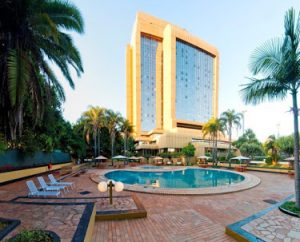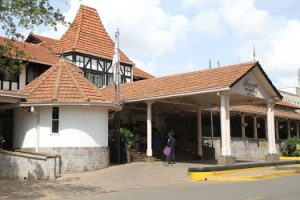
- The Pretty Big One
“Sally, Khati, wake up, wake up! There has been a big earthquake in San Francisco and the Bay Bridge has fallen down!” We had just arrived in Gaborone the night before, and were still in a jetlagged fugue state of unknown time and place. Farashah had rushed back from work with the big news.
We had no details. Television? None in the house. Radio? I can’t recall. And really, why should it be covered 24/7 in Botswana? When you read about a disaster on the other side of the world, how many details do you hear? Internet? Smartphone? This was 1989.
Details, we needed details. Was this “The Big One”? Richter scale? If the bridge-one of the busiest in the world–was down, what else went into the sea–cars, buses, people? Was the whole Bay Area destroyed? Building collapses, fires? Friends, family, workplaces, pets? Should we try to return immediately?
We had no details. Television? None in the house. Radio? I can’t recall. And really, why should it be covered 24/7 in Botswana? When you read about a disaster on the other side of the world, how many details do you hear? Internet? Smartphone? This was 1989.
But there were land lines, and Farashah had invested in a house phone capable of international calls, cost be damned. We anxiously dialed home: “Due to the earthquake in the area, we are unable to complete your call.” What? Now all our worst fears seemed confirmed. Call again: “Due to the earthquake….”. Again: nothing.
We called family in other parts of the US to assure them we were okay, though of course we were a world away from the earthquake. They had no details either, but enough general information to ratchet down the apocalypse of our imaginations. We kept trying to get through to Oakland.
Finally, interminable hours later, we connected with Felicia, who was staying at our Oakland house with her feisty Chihuahua, Mr. Pippin. At last, details. Yes, earthquake, but only the “Pretty Big One”. One section of the bridge fell, but miraculously it was almost empty; everyone was at Candlestick Park just as the World Series between the Oakland A’s and SF Giants was starting, or else at home watching the game. A papier mache rooster fell off our mantle. When the shaking began, Felicia gathered up Mr. Pippin and our two quarrelsome dogs and headed to the front porch, where cars had stopped as the street rolled. It was then she realized she was only in her bra and panties.
- Smooth Operator
Harare was splendid with streets lined with purple jacaranda trees. We hadn’t expected it would also be completely booked up—there was literally no room in the inn when we drove in from Botswana. Some kind-hearted local at the consulate overheard us calling around to the least reputable spots in our “Africa on a Shoestring” guide (“Oh no, not the Queen Mary! We must find something else!”) and talked a couple he knew into taking us in their home. We soon became good friends.
On the edge of town, inside a gated compound, stood the gleaming Sheraton Hotel. It was hosting an international conference of public service unions, and I had a pass because I was an officer in my state SEIU local. Once inside, you were no longer in Harare, Zimbabwe, Africa, but rather “International Hotel Land”. The dissonance was stunning.
In the center lobby stood a desk with a computer, and nattily-dressed hotel staff helping the guests. Our next stop was Nairobi, and we had no reservations and so, chastened by our bad luck, I gave it a go—could they help us confirm our plane reservation and set us up with a hotel on arrival? The clean-cut, friendly and efficient young man gave a big smile and of course, no problem. Hands flew over the keyboard and like magic, all was organized. The wonders of modern computers and communications!
After our plane arrived in Nairobi, and we arrived at the lovely Norfolk hotel (hang the expense), the wonders ceased. Despite our printout from the Harare computer, they had no record of a reservation, and were full up. Eventually they took pity and we eked out one night there, before we were back on the street. We ate every last morsel in the room’s fruit basket
- Great Expectations
My sister worked for the Peace Corps in the 1990’s, and traveled around the world to review assignment locations. Volunteers were often placed in remote areas with very limited infrastructure. The Corps wanted to make sure volunteers got the support they needed, and there was no substitute for actually visiting.
After the fall of the Soviet Union, there were some new assignments in the former socialist republics, such as Kazakhstan. When I asked her what it was like, she reported that conditions were fairly grim, but unlike some postings, they had large buildings, elevators, phones and appliances, stores and paved roads. The volunteers struggled nonetheless.
It turned out that the volunteers posted to really remote and undeveloped assignments, where they expected minimal modern technology, adapted pretty well. The ones who suffered more were those placed in locations where they had the illusion of western comforts–but in fact nothing worked.






Fascinating stories, Khati. Now we get TMI about natural disasters, etc. In her later years, we had to remove the weather app from my mother’s phone and tell her to stop watching the weather channel. She was too upset about tornados, hurricanes, and earth quakes remotely near anyone she knew. We are used to instant, but not necessarily accurate, information.
This may be why this is called “Retrospect”—reflecting on the way it used to be. It may also help to remember that information 24/7 has its downside!
Really perceptive take about technology working, and not, throughout the world, Khati. I lived in Palo Alto during the 1989 quake and could call Boston, Connecticut, and Texas, but not locally, for a couple of days. Of course there were only land lines then. I really like your Peace Corps conclusion and how technology can play with the mind. If you have expectations, beware.
Dashed expectations are hardly unique to tech of course–but searching for the balance of hope and resignation is not easy.
You give us a vivid picture of what life is like without all the convenience of on-line access at your fingertips, Khati. We have come to take it for granted, but a mere three decades ago, that was not the case, and even now, in more remote, or less developed parts of the world (or even in this country), one cannot count on it. Thank you for this look back and excellent reminder.
The “digital divide” continues to be a big issue everywhere. It is probably good not to get too dependent on advanced technology, or at least have a plan B.
You have has the most amazing adventures, Khati. And thanks for sharing them all with us. A great reminder that we are part of an entire planet and not just one country (if that).
My San Francisco earthquake adventure was far more prosaic. I was watching the baseball game on TV, safely on the East Coast. But I then remembered that, purely coincidentally, almost every other lawyer in our legal department was in the San Francisco area right then. I was tempted to pull an Alexander Haig “I’m in charge here!” move, but instead, and more responsibly, was able to check on most of them. Happily, they were all safely ensconsed in posh hotels in Marin County.
Great story about your legal department team–and I remember Alexander Haig too.
Love your three distinct stories here, Khati. Trying to get info about the SF earthquake in Botswana (how did Farashah even know about it?) and being unable to get a phone call through. Trying to get a hotel in Nairobi from a computer in Zimbabwe and finding that despite a printout they had no record of it. And finally the wisdom from your sister’s Peace Corps experience, that your satisfaction depends on your expectations. Thanks so much for your cosmopolitan perspective!
Technology tribulations of a very basic kind. We just have them magnified now, but the point about expectations remains apt regardless.
Your earthquake story reminds me of a story my father told: he and my mother were traveling in Italy in October of 1989. They were in a cafe somewhere when a man my father was talking to asked, “You’re from San Francisco, right?” Right, he replied. The man said, “You had a big earthquake there.” And my dad said, “Yeah, in 1906.” No, the man said, and pointed to the TV that showed the Bay Bridge, the collapsed freeway, and the destroyed houses in the Marina. And that’s when he called me in tears at 2:00am to find out if we were all OK!
A sad story but glad to know you were all okay! Getting the story right can be hard though—later on the trip someone told us there was a big problem in our city. When we pressed further, it turned out it wasn’t San Francisco, but the fall of Ceausescu in Romania.
As always love your global tales Khati.
And all these tech tribulation tales make me think a simpler life with simpler expectations may well be better!
We love tech when it works and makes our lives simpler. It just seems that is rarer than one would hope! I continue to be a fan of “less is more”.
I, too, love your global tales, Khati! Your first one brought back a vivid memory: During a magnitude 6.6 quake here in Southern California in 1971, at about 6 a.m., I found myself standing naked outside the teepee I’d been sleeping in at a commune in the Hollywood Hills. (Just for fun, here’s a link to a story about the place: http://wesclark.com/burbank/susie_commune.html) Anyway, ever since then, I make sure to have an outfit by the side of my bed and ready to jump into should the ground begin to roll. At least Felicia was in her bra and panties!
Wow, they always told us to have a “go bag” in case of earthquake, and you really made me laugh when you told the back story of yours! You must have many more stories to tell if you were at the commune mentioned in the article too. Your free spirit has not disappeared. Thanks for the comments.
Tech stories from around the world! Good one, Khati. I haven’t been to Botswana or Kazakhstan, but I’d say that the 1989 Bay Area quake was much bigger than ‘pretty big.’ But I certainly was involved in the techno snarl in Los Angeles. None of my friends or family could talk to each other, but they could call out and we could call in. So we became a clearinghouse for some pretty bizarre earthquake episodes.
It was definitely alarming to discover the phone lines were so compromised, and finding out what was going on was hard regardless of where you found yourself. We take cellphone service for granted now, but that is not immune to disaster either. Tech is amazing except when it isn’t.